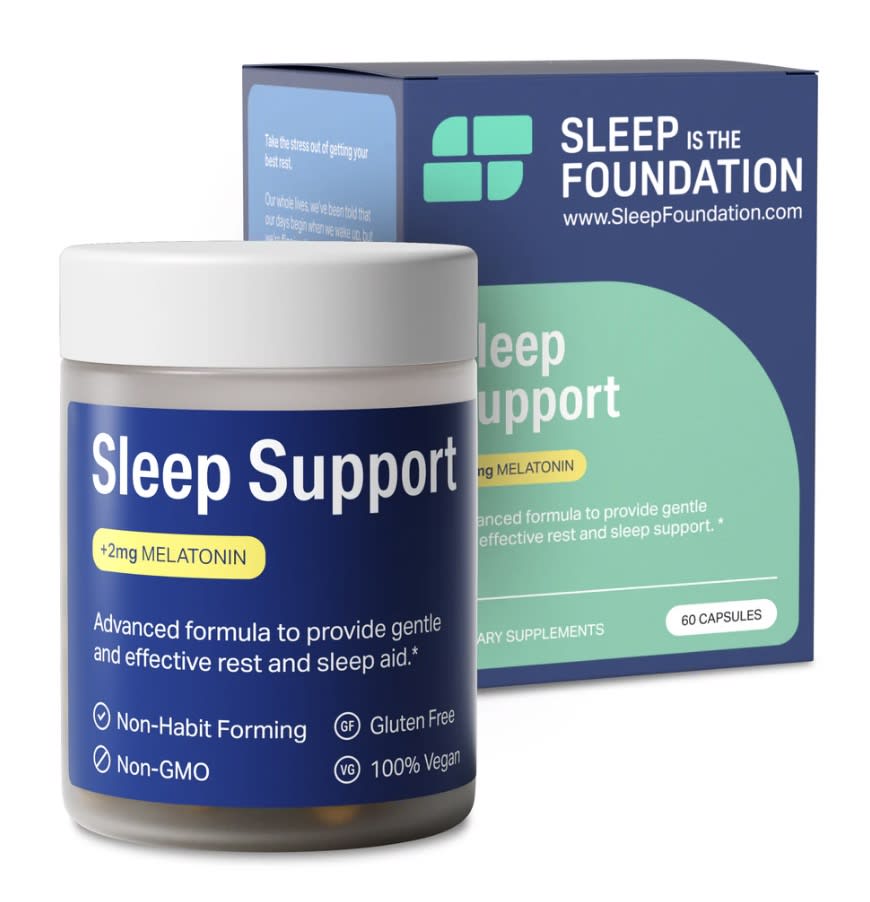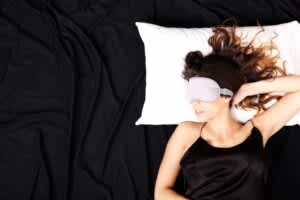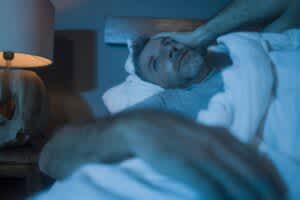The following content should not be used as medical advice or as a recommendation for any specific supplement or medication. It is important to consult your health care provider prior to starting a new medication or altering your current dosage.
Vitamin D is one of 13 vitamins that your body needs to function. It promotes strong bones and teeth by helping the body absorb calcium and preventing the bones from breaking down. It also supports the immune system, nervous system, and muscles.
The brain, liver, lungs, muscles, and skin all use vitamin D. However, many people don’t get the amount of vitamin D that they need. Having low levels of vitamin D—also called vitamin D deficiency—can put people at risk for a number of health problems, including sleep disorders.
Learn more about vitamin D, how it can affect your health and sleep, and steps you can take to make sure you’re getting enough vitamin D.
How Vitamin D Works
There are two main types of vitamin D: vitamin D2 and vitamin D3. To get vitamin D2, you must ingest foods or dietary supplements that contain it. Similarly, vitamin D3 is available in these forms, but it is also naturally produced by your skin during exposure to sunlight.
While both types of vitamin D are beneficial, vitamin D3 appears to be more potent and to last longer in the body.
Because vitamin D from food or supplements requires fat to dissolve, experts often recommend consuming it alongside food that contains some fat. Once it enters the bloodstream, vitamin D is processed by the liver and kidneys and distributed throughout the body by the circulatory system.
As people age, their natural ability to produce vitamin D3 declines. For this reason, the recommended daily amount of vitamin D varies by age. Vitamin D amounts are measured in micrograms (mcg) or international units (IU).
| Age Group | Age Range | Average Daily Recommended Amount of Vitamin D |
|---|---|---|
| Babies | 0-12 months old | 10 mcg (400 IU) |
| Children | 1-13 years old | 15 mcg (600 IU) |
| Teenagers | 14-18 years old | 15 mcg (600 IU) |
| Adults | 19-70 years old | 15 mcg (600 IU) |
| Older Adults | 71+ years old | 20 mcg (800 IU) |
Some people may need more vitamin D, especially if they have a vitamin D deficiency.
The Link Between Vitamin D and Sleep
Research suggests that vitamin D plays an important role in sleep. Adults and children with vitamin D deficiency are more likely to have:
- Delayed bedtimes
- Less time asleep each night
- Low quality sleep
- Nighttime wakings
Moreover, people with vitamin D deficiency have a higher risk of developing sleep disorders.
While scientists are still investigating the relationship between vitamin D and sleep, there are several theories about why having too little vitamin D often coincides with sleep problems.
- Vitamin D is a Vital Part of Brain Function: There are many vitamin D receptors in the parts of the brain that are involved in sleep, so a lack of vitamin D might prevent these areas from functioning properly.
- Sunlight Affects Both Vitamin D Production and Sleep: Because sunlight helps the body manufacture vitamin D and regulate circadian rhythms, limited exposure to sunlight could negatively affect both vitamin D production and a person’s natural sleep-wake cycle.
- Melatonin Production Relies on Vitamin D: Vitamin D helps the body produce melatonin, a hormone that supports sleep. Low levels of vitamin D could result in low levels of melatonin, leading to sleep problems.
More research is needed to fully explain how vitamin D affects sleep.
Our Top Pick for Melatonin Supplements

Sleep Is the Foundation Sleep Support Melatonin Capsules
Sleep Is the Foundation Sleep Support Melatonin Capsules are made using a proprietary herbal blend along with melatonin and GABA to help you fall and stay asleep. While you should chat with your doctor before taking any melatonin supplement for the first time, these are vegan, gluten-free, and non-GMO, and they are not habit-forming.
Can Vitamin D Help With Sleep?
While vitamin D deficiency and poor sleep are clearly linked, it’s less clear whether vitamin D can prevent or relieve sleep problems.
Some studies have found that vitamin D supplements can improve sleep quality and quantity. But other studies concluded that they have no effect on sleep and may even decrease sleep quality.
One explanation for these inconsistencies might be the length of time the studies lasted. Studies lasting 10 to 12 weeks were more likely to find an association between vitamin D supplements and better sleep than long-term studies lasting from six months to five years.
This suggests that taking vitamin D supplements may be more effective as a short-term treatment for sleep problems that occur alongside a vitamin D deficiency. But additional studies are needed to know whether vitamin D is an effective treatment for sleep disorders.
Health Effects of Low Vitamin D
About one in four people have vitamin D levels that are too low for their body’s health needs. Some people are more likely to develop vitamin D deficiency than others, including:
- People with lifestyles that limit their exposure to sunlight
- Infants who are exclusively breastfed
- Older adults
- People with darker skin
- People with obesity
- People with kidney or liver disease
- People with celiac disease or Crohn’s disease
People in these groups can have trouble accessing, producing, processing, or absorbing vitamin D.
Besides contributing to sleep problems, vitamin D deficiency increases the risk of developing a number of health concerns.
- Loss of Bone Density: Not getting enough vitamin D can prevent bones from getting the minerals they need to stay strong and hard, increasing a person’s vulnerability to injuries and bone diseases such as osteoporosis.
- Rickets: In children, low levels of vitamin D may lead to rickets, a disease that can cause painful bone deformities.
- Cognitive Decline: In older adults, vitamin D deficiency may contribute to declines in mental functioning and may even lead to dementia.
Some studies have also linked vitamin D deficiency to heart disease, multiple sclerosis, diabetes, and depression. However, there’s little evidence, if any, that taking vitamin D supplements can prevent or treat these conditions.
Ways to Increase Vitamin D
If you’re worried you might not be getting enough vitamin D, your doctor can conduct a blood test to measure your body’s vitamin D levels.
There are three ways to boost your vitamin D levels:
- Dietary supplements
- Foods rich in vitamin D
- Exposure to ultraviolet (UV) light
However, because UV light is known to cause skin cancer, experts do not recommend using sun exposure or tanning beds to get more vitamin D.
If you are diagnosed with a vitamin D deficiency, your doctor will likely prescribe a supplement. You can also eat foods that support healthy levels of vitamin D.
Dietary Supplements
Vitamin D supplements are some of the most commonly used dietary supplements in the U.S. These supplements can help raise the level of vitamin D in the blood. To help the body absorb the supplements, it’s best to take them along with a fatty meal or snack, such as avocado toast, a handful of nuts, or a piece of fish.
As with any supplement or medication, make sure to read the product label carefully and to consult with a health care provider about the dosage, timing, and duration of your vitamin regimen.
While supplements can help your body get the amount of vitamin D it needs, overusing vitamin D supplements can have toxic effects. Additionally, vitamin D can interact with some medications in problematic ways, and some medical conditions can impact how much vitamin D you can safely take.
Make sure to speak with a doctor about these topics if you want to take a vitamin for sleep or if you need guidance on taking a vitamin D supplement.
Foods Rich in Vitamin D
While food alone is unlikely to give you all the vitamin D you need, your diet can be a source of this essential nutrient. A handful of foods are naturally rich in vitamin D, including:
- Egg yolks
- Saltwater fish, such as salmon and tuna
- Cheese
- Beef liver
- Mushrooms
Additionally, some foods like milk, cereal, and juice have vitamin D added to them, as do most baby formulas.
References
Ask the Sleep Doctor
Have questions about sleep? Submit them here! We use your questions to help us decide topics for articles, videos, and newsletters. We try to answer as many questions as possible. You can also send us an email. Please note, we cannot provide specific medical advice, and always recommend you contact your doctor for any medical matters.








































